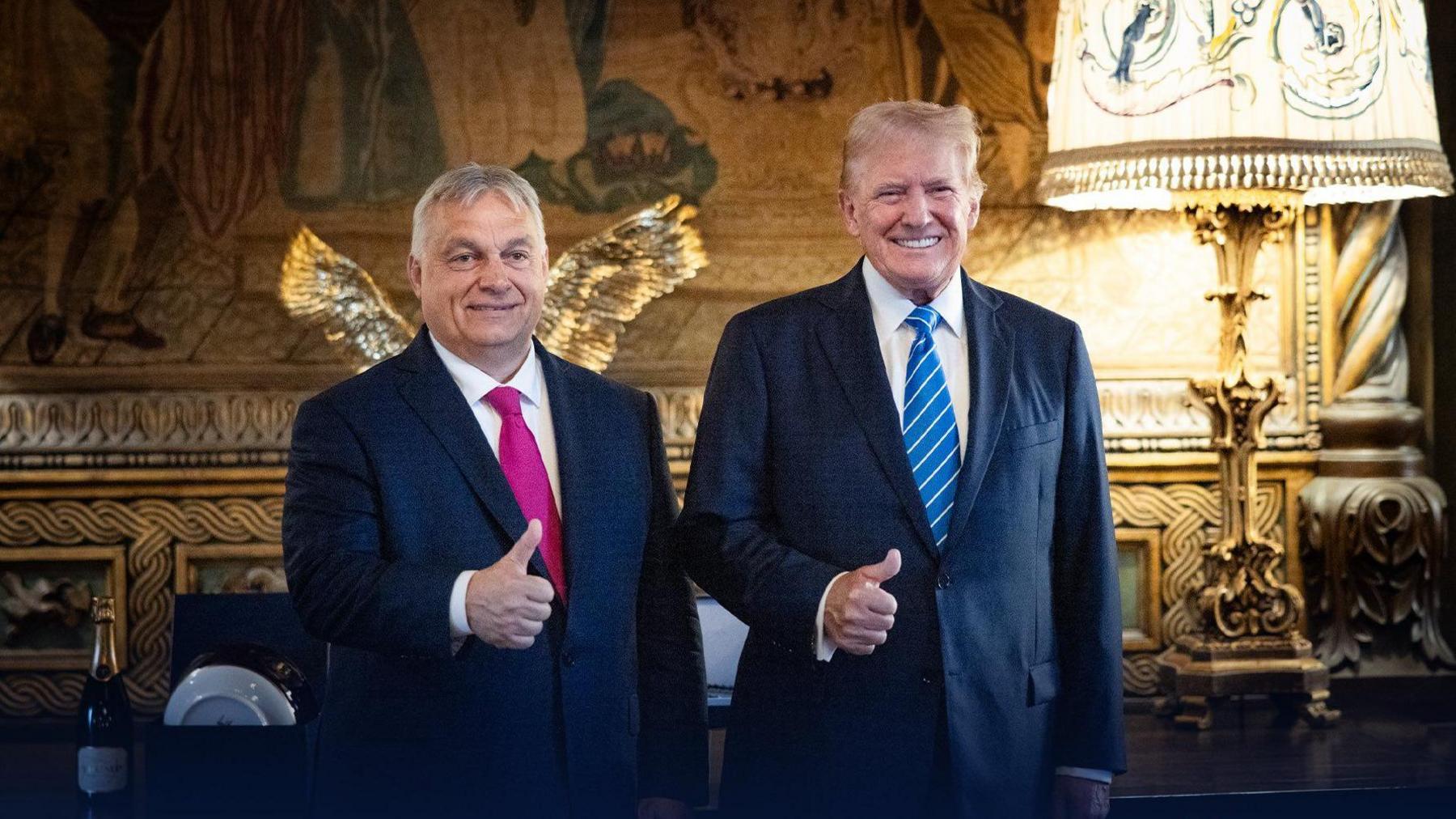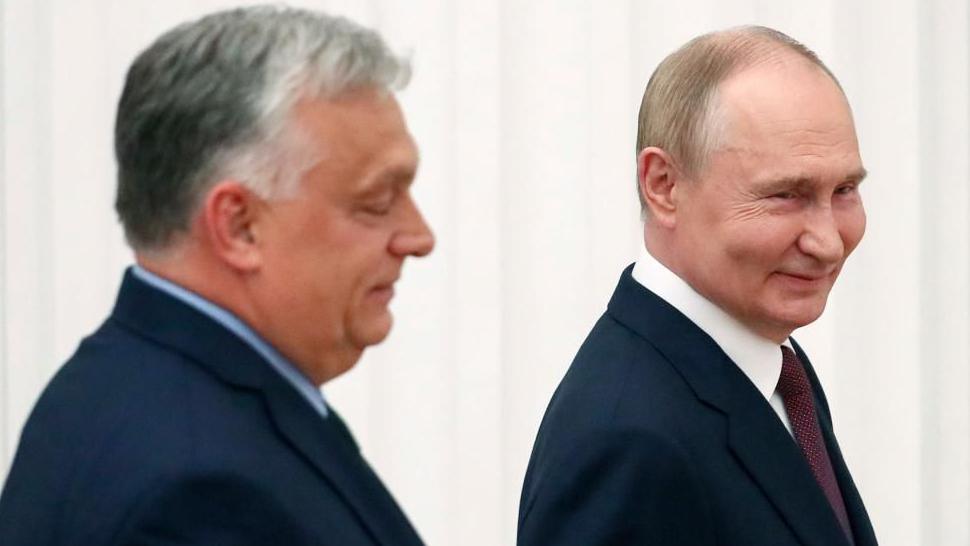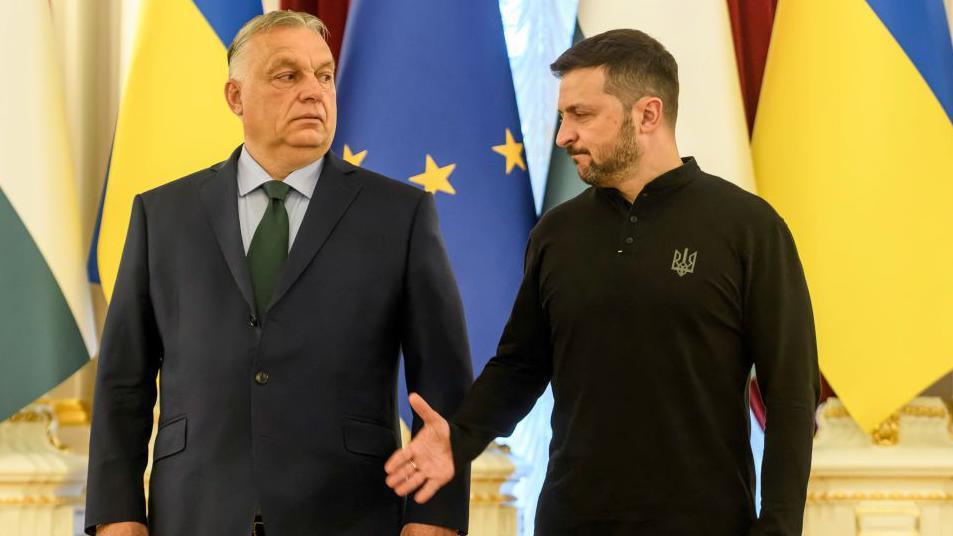Orban goes global as self-styled peacemaker without a plan

Viktor Orban finished off his global tour with Donald Trump, dubbing his visit "Peace mission 5.0"
- Published
Hungary's Viktor Orban has no peace plan of his own, but he has spent the past two weeks on a whistle-stop tour of Kyiv, Moscow, Azerbaijan, Beijing, Washington and even Mar-a-Lago, on a one-man mission that has infuriated leaders in the EU and US.
"Peace will not come by itself in the Russia-Ukraine war, someone has to make it," he proclaims in videos posted daily on his Facebook page.
He has been bitterly attacked by both Brussels and Washington for breaking EU and Nato unity and cosying up to Vladimir Putin and China’s leader Xi Jinping.
Few argue with his central premise, that there can be no peace without peacemakers. But his close economic relationship with Russia’s president leaves him open to the charge of acting as Mr Putin’s puppet.
The right-wing Hungarian PM says a ceasefire tied to a specific deadline would be a start.
"I am not negotiating on behalf of anyone," he told Hungarian radio during a brief stopover in Budapest between visits to Volodymyr Zelensky in Kyiv and Mr Putin in Moscow.

Mr Orban visited the Russian leader, three days after his trip to Kyiv
For the next six months, Hungary holds the rotating presidency of the European Union.
Mr Orban followed up his first visit to Kyiv since the start of the war with the first trip by an EU leader to Russia since April 2022. That visit to the Kremlin clearly angered his European partners.
Charles Michel, the head of the European Council of 27 EU governments, said the rotating presidency gave no mandate to engage with Russia on the EU’s behalf.
Mr Orban admitted that was the case, but insisted: "I’m clarifying the facts… I’m asking questions."
In Kyiv he posed "three or four" to President Zelensky "so that we can understand his intentions, and where the red line is, the boundary up to which he can go in the interest of peace".
He has also been generous in his praise of two other allies, Xi Jinping and Turkish President Recep Tayyip Erdogan.
Meeting Mr Erdogan on arrival at the Nato summit in Washington, he spoke of him as "the only man who has overseen an agreement between Russia and Ukraine" so far, referring to a now defunct Black Sea grain agreement.

Mr Orban's whistlestop tour began with a visit to Ukraine's Volodymyr Zelensky on 2 July
"China not only loves peace but has also put forward a series of constructive and important initiatives [for resolving the war]," he said of President Xi Jinping, according to Chinese state media.
The final visit on his whirlwind tour was to presidential candidate Donald Trump, another close ally who he strongly backs to win again in November and who he refers to as a man of peace.
In one interview, he declared that during Trump’s four-year term as president “he did not initiate a single war".
This has been a remarkable trip in the international limelight for the leader of a small East European country with 9.7 million inhabitants. But who is it designed to impress, and could it have any effect?
A key target of his message is the domestic public.
Viktor Orban has had a relatively bad year so far, losing the two most prominent female politicians in his party to a scandal in February, and witnessing the emergence of his first serious challenger for more than a decade - Peter Magyar.
In June, Mr Orban’s Fidesz party won an impressive 45% in European elections, to 30% for Mr Magyar’s three-month-old Tisza party.
But he lost more than 700,000 votes (one in four) compared with the last parliamentary elections in 2022.
For the first time, he does not look invincible.
What better way to show Hungarians that their leader was still strong than to parade across the world stage, in a global tour "to make peace"?
His mission was also targeted at an international public, in the week that his new Patriots for Europe (PfE) group in the European Parliament attracted 84 MEPs from mainly far-right parties in 11 countries.
Patriots for Europe has emerged as the third largest faction in parliament, edging aside the rival Conservatives and Reformist group of Italy’s Giorgia Meloni.
Mr Orban's visit to Moscow won him effusive praise from the Russians: “We take it very, very positively. We believe it can be very useful,” said Kremlin spokesman Dmitry Peskov.
The US was less impressed.
“We would welcome, of course, actual diplomacy with Russia to make it clear to Russia that they need to respect Ukraine's sovereignty, that they need to respect Ukraine's territorial integrity,” said US State Department spokesman Matthew Miller. “But that is not at all what this visit appears to have been.”
At the same time, the US did welcome Mr Orban's first visit to neighbouring Ukraine since the start of the full-scale Russian invasion.
Who is Viktor Orban, Hungarian PM with 14-year grip on power?
- Published13 February 2024
Hungary's Russia-friendly PM meets Putin in Moscow
- Published5 July 2024
Project 2025: A wish list for a Trump presidency, explained
- Published14 February
The Hungarian leader has given very little away about the actual content of his talks in Kyiv, Moscow or Beijing.
A leaked version of his letter to Charles Michel, sent from Azerbaijan, offers some clues.
Mr Putin was open to a ceasefire, Mr Orban told the European Council president, provided it did not provide Ukraine with a chance to reorganise its army on the front lines.
Three days earlier in Kyiv, on 2 July, the Ukrainian leader used a similar argument, telling Mr Orban that the Russians would abuse any ceasefire to regroup their invading forces.
Mr Orban was apparently "surprised" that President Zelensky still believed Ukraine could win back its lost territories.
And Vladimir Putin told Mr Orban that "time favours Russian forces", according to the leaked letter.
Arriving in Washington days later, Mr Orban posted yet another video on Facebook, saying he would argue that Nato "should return to its original spirit: Nato should win peace, not the wars around it".
Unlike his Nato allies, Viktor Orban views Russia’s two-and-a-half year war in Ukraine as a civil war between two Slav nations, prolonged by US support for one of them.
One thing he probably does agree on is that this autumn the conflict will become only worse.
A Trump presidential victory in November, he believes, would force the Ukrainians and Russians to the negotiating table.